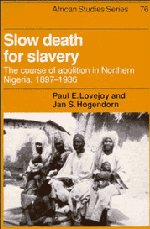Book contents
- Frontmatter
- Contents
- List of maps
- List of tables
- Preface
- 1 Slavery and the British conquest of Northern Nigeria
- 2 Fugitive slaves and the crisis in slavery policy
- 3 The debate on legal-status abolition
- 4 Emancipation and the law
- 5 Upholding proprietary rights to land
- 6 The role of taxation in the reform of slavery
- 7 The colonial economy and the slaves
- 8 The persistence of concubinage
- 9 Legal-status abolition: the final phase
- Appendix: Court records of slaves issued certificates of freedom
- Notes
- Glossary
- Bibliography
- Index
- Title in the series
2 - Fugitive slaves and the crisis in slavery policy
Published online by Cambridge University Press: 03 May 2011
- Frontmatter
- Contents
- List of maps
- List of tables
- Preface
- 1 Slavery and the British conquest of Northern Nigeria
- 2 Fugitive slaves and the crisis in slavery policy
- 3 The debate on legal-status abolition
- 4 Emancipation and the law
- 5 Upholding proprietary rights to land
- 6 The role of taxation in the reform of slavery
- 7 The colonial economy and the slaves
- 8 The persistence of concubinage
- 9 Legal-status abolition: the final phase
- Appendix: Court records of slaves issued certificates of freedom
- Notes
- Glossary
- Bibliography
- Index
- Title in the series
Summary
The conquest of the Sokoto Caliphate was undertaken as an anti-slavery campaign against a Muslim state in which slavery was essential to its economy and the bedrock of its society. Yet neither the Royal Niger Company nor the Protectorate government wanted to end slavery or encourage any dislocation that might impede the consolidation of colonial rule. During the RNC period of the conquest from 1897 to 1900, there was considerable confusion over the slavery issue, particularly with respect to escaped slaves. Goldie and his senior officers said they would not harbor fugitives, but they often did. The actions of the Protectorate government were more consistent, but even then it took a year or more to make it clear to subordinates that fugitives were not to be protected, unless there were signs of severe ill treatment. Official policy appeared to allow slaves to leave their masters if they so chose, but in practice they were to be discouraged, even obstructed. Despite the use of abolitionist rhetoric to justify the conquest, British imperialism was committed to the continuation of slavery, abolishing only its legal status.
The ideological overtones of the conquest were bound to filter through to the slaves nonetheless, especially since the pronouncements on slavery seemed to mean that slavery was over and the actions of the RNC and the Protectorate government often indicated as much.
- Type
- Chapter
- Information
- Slow Death for SlaveryThe Course of Abolition in Northern Nigeria 1897–1936, pp. 31 - 63Publisher: Cambridge University PressPrint publication year: 1993

